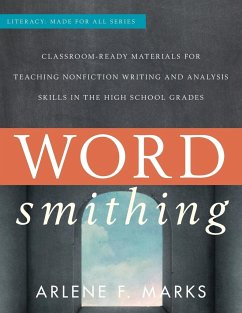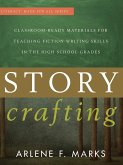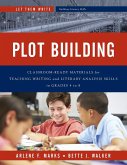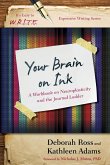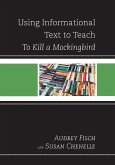Arlene F. Marks
Wordsmithing
Classroom Ready Materials for Teaching Nonfiction Writing and Analysis Skills in the High School Grades
Arlene F. Marks
Wordsmithing
Classroom Ready Materials for Teaching Nonfiction Writing and Analysis Skills in the High School Grades
- Broschiertes Buch
- Merkliste
- Auf die Merkliste
- Bewerten Bewerten
- Teilen
- Produkt teilen
- Produkterinnerung
- Produkterinnerung
WORDSMITHING focuses on the creation, production and sharing of a variety of nonfiction writing projects.
Andere Kunden interessierten sich auch für
![Story Crafting Story Crafting]() Arlene F. MarksStory Crafting99,99 €
Arlene F. MarksStory Crafting99,99 €![Plot Building Plot Building]() Arlene F. MarksPlot Building84,99 €
Arlene F. MarksPlot Building84,99 €![Your Brain on Ink Your Brain on Ink]() Kathleen AdamsYour Brain on Ink50,99 €
Kathleen AdamsYour Brain on Ink50,99 €![Studying and Learning in a High-Stakes World Studying and Learning in a High-Stakes World]() Rona F. FlippoStudying and Learning in a High-Stakes World66,99 €
Rona F. FlippoStudying and Learning in a High-Stakes World66,99 €![Using Informational Text to Teach To Kill A Mockingbird Using Informational Text to Teach To Kill A Mockingbird]() Susan ChenelleUsing Informational Text to Teach To Kill A Mockingbird62,99 €
Susan ChenelleUsing Informational Text to Teach To Kill A Mockingbird62,99 €![Stages of Literacy Development Stages of Literacy Development]() Stages of Literacy Development95,99 €
Stages of Literacy Development95,99 €![Healthy Teens, Healthy Schools Healthy Teens, Healthy Schools]() Vanessa DomineHealthy Teens, Healthy Schools95,99 €
Vanessa DomineHealthy Teens, Healthy Schools95,99 €-
-
-
WORDSMITHING focuses on the creation, production and sharing of a variety of nonfiction writing projects.
Hinweis: Dieser Artikel kann nur an eine deutsche Lieferadresse ausgeliefert werden.
Hinweis: Dieser Artikel kann nur an eine deutsche Lieferadresse ausgeliefert werden.
Produktdetails
- Produktdetails
- Verlag: Globe Pequot Publishing Group Inc/Bloomsbury
- Seitenzahl: 248
- Erscheinungstermin: 4. Juni 2014
- Englisch
- Abmessung: 280mm x 216mm x 14mm
- Gewicht: 634g
- ISBN-13: 9781475807363
- ISBN-10: 1475807368
- Artikelnr.: 40449199
- Herstellerkennzeichnung
- Produktsicherheitsverantwortliche/r
- Europaallee 1
- 36244 Bad Hersfeld
- gpsr@libri.de
- Verlag: Globe Pequot Publishing Group Inc/Bloomsbury
- Seitenzahl: 248
- Erscheinungstermin: 4. Juni 2014
- Englisch
- Abmessung: 280mm x 216mm x 14mm
- Gewicht: 634g
- ISBN-13: 9781475807363
- ISBN-10: 1475807368
- Artikelnr.: 40449199
- Herstellerkennzeichnung
- Produktsicherheitsverantwortliche/r
- Europaallee 1
- 36244 Bad Hersfeld
- gpsr@libri.de
Born and raised in Toronto, Arlene F. Marks found her storytelling muse at the age of 6, and she has been writing and sharing her imaginative tales ever since. She is also a retired educator and veteran teacher of the craft, having authored two literacy programs for the classroom, as well as From First Word to Last: The Craft of Writing Popular Fiction. During her life, she has worked as everything from a travel agent to a fashion consultant. However, her first love and current obsession is writing speculative fiction.Arlene lives with her husband on the shore of beautiful Nottawasaga Bay. She spends an inordinate amount of time following her characters around the universes in her mind, but she can be lured away from them by dark chocolate... and interesting owls to add to her collection. www.thewritersnest.ca
About Literacy Made for All Aims and Objectives of the Program Introduction to Wordsmithing A. WRITING PROJECTS Introduction/Aims and Objectives Project 1: Write an Advertising Campaign ...in 3 different media: Video/Television, Print/Magazine, Billboard or Teeshirt Reproducibles/Media:WDR 1
Questions Advertisers Must Ask WDR 2
Advertising Plan Sheet WDR 3
Sample TV Script Page WDR 4
Magazine Ad Strategies WDR 5
Proofread with a Partner Checklist: Video Ad Script WDR 6
Writing an Ad Campaign Assessment Sheet Project 2: Write and Deliver a Speech Debating Speech, Election speech, Acceptance speech, Speech for evaluation/competition Reproducibles/Media:WDR 7
Speech Planner Sheet WDR 8
Speech Outline Chart WDR 9
Debate Assessment Sheet WDR 10
Acceptance Speech Questions WDR 11
Second Draft Questions WDR 12
Written Speech Assessment Sheet WDR 13
Speech Assessment Criteria Project 3: Write a Personal Essay Sharing an experience, Sharing an opinion, Opening a window on the author's world Reproducibles/Media:WDR 14
Essay and Article Outline WDR 15
Proofread with a Partner Checklist
Personal Essay WDR 16
Personal Essay Assessment Sheet Project 4: Write a Biographical/Personality Profile Profile a family member, an historical figure, a fictional character Reproducibles/Media:WDR 17
Present Situation Bio Sheet WDR 18
Past History Bio Sheet WDR 19
Future Goals Bio Sheet WDR 20
How to Interview WDR 21
Personality Profile Planner WDR 22
Proofread with a Partner Checklist
Personality Profile WDR 23
Personality Profile Assessment Sheet Project 5: Write a Review ...of a television show, a movie sequel or prequel, a music CD/album, a game Reproducibles/Media:WDR 24
Review Planner WDR 25
Proofread with a Partner Checklist
A Review WDR 26
Review Assessment Sheet Project 6: Write a Researched Article ...for submission to a magazine Reproducibles/Media:WDR 27
Tracking Sheet
Individuals WDR 28
Letter to Parents WDR 29
Student Researcher ID Cards WDR 30
Article Planner WDR 31
Research Report Sheet WDR 32
Proofread with a Partner Checklist
A Researched Article WDR 33
Researched Article Assessment Sheet Project 7: Write Documentation ...to accompany things that do not usually come with instructions for care: teenagers, families, new babies, your health.... Reproducibles/Media:WDR 28
Letter to Parents WDR 34
Tracking Sheet
Groups WDR 35
Documentation Planner WDR 29
Student Researcher ID Cards WDR 31
Research Report Sheet WDR 36
Documentation Assessment Sheet Project 8: Write a Formal Letter Covering letter, Letter of complaint, Letter of application, , Letter of apology, thanks, congratulations, or condolences Reproducibles/Media:WDR 37
Formal Letter Format WDR 38
Formal Letter Assessment Sheet Project 9: Write a Report Book report, Resumé, Researched report on teen behavior Reproducibles/Media:WDR 39
Book Report Assessment Sheet WDR 40
Resumé Assessment Sheet WDR 41
Letter to Parents (re Survey Assignment) WDR 42
Information Report Assessment Sheet B. STUDYING THE ESSAY Introduction/Aims and Objectives Part 1: Build Your Toolkit Students familiarize themselves with literary terminology as they describe and discuss short nonfiction at three levels of analytical complexity. Assignment 1: Define the Essay Identifying and charting the characteristics of 5 different kinds of essays. Reproducibles/Media:SER 1
Types of Essays Information Sheet SER 2
Types of Essays Worksheet SER 2A
Types of Essays Worksheet
exemplar filled in SER 3
Essay Analysis Worksheet Assignment 2: Methods of Development and Thesis Support Identifying and classifying the steps in building an essay and appealing to the reader. Reproducibles/Media:SER 4
Methods of Development Assignment 3: Analyze on the Technical Level An introduction to rhetorical devices that determine how the essay looks and sounds. Reproducibles/Media:SER 5
A Glossary Of Rhetorical/Literary Terms SER 6
Rhetorical Devices/Levels of Analysis SER 7
Answering An Effectiveness Question (Technical) Assignment 4: Analyze on the Associative Level An introduction to rhetorical devices that compare and contrast the essay's content with the real world. Reproducibles/Media:SER 8
Answering an Effectiveness Question (Associative) Assignment 5: Analyze on the Thematic Level An introduction to rhetorical devices that focus on what the reader brings to the reading of the essay. Reproducibles/Media:SER 9
Answering an Effectiveness Question (Thematic) Assignment 6: Practice Close Reading of an Essay How each word of an essay can contribute to its depth of meaning and its impact on the reader. Assignment 7: Practice Analyzing an Essay How to answer effectiveness questions about examples from an essay. Reproducibles/Media:SER 10
Levels of Analysis
Effectiveness Summative Product: Write a Sight Test Reproducibles/Media:SER 11
Tips for Writing a Sight Test Summative Product: Answer an Effectiveness Question Reproducibles/Media: SER 12
Answering an Effectiveness Question Editing Checklist SER 13
Answering an Effectiveness Question Assessment Sheet Part 2: Write a Literary Response As students practice writing three different kinds of responses to short essays they will be honing both their writing and their critical thinking skills. Assignment 1: Write a Dialectical Response to an Essay Two columns on a sheet of paper, point form personal response to selected words or sentences. Assignment 2: Write a Personal Response to an Essay A short personal essay inspired by a work of short nonfiction. Reproducibles/Media:SER 14
Writing a Personal Response SER 14A
The Writing Process (verso of SER 14) Assignment 3: Write an Analytical Response to an Essay A short essay critically examining the effectiveness of another essayist's choices. Reproducibles/Media:SER 15
Writing an Analytical Response Completing The Final Draft, All Responses Practicing the writing process to arrive at a finished product. Reproducibles/Media:SER 16
Proofread with a Partner
Dialectical Response SER 17
Proofread with a Partner
Personal Response SER 18
Proofread with a Partner
Analytical ResponseSER 19
Assessment Checklist
Dialectical Response SER 20
Assessment Checklist
Personal Response SER 21
Assessment Checklist
Analytical Response Part 3: Timed Writing Practice Students learn and practice techniques that will help them do their best when answering essay
response questions on English examinations. Assignment 1: Lay the Foundations An introduction to syntax and diction. Reproducibles/Media:SER 22
Introduction to Syntax SER 23
Clauses Determine Sentence Patterns SER 24
Phrases Enhance Sentence Meaning SER 25
Syntactical Effects SER 26
Diction: The Art of Carefully Choosing Words Assignment 2: Practice Unpacking Prompts Closely reading a question to determine how to respond. Reproducibles/Media:SER 27
Analyzing Tone in Literature SER 28
How to Read a Literary Question Assignment 3: Develop a Supporting Example Fully analyzing a selected quotation in the body of a written response. Reproducibles/Media:SER 6
Rhetorical Devices/Levels of Analysis SER 10
Levels Of Analysis
Effectiveness Assignment 4: Organize an Essay Length Response (DFAR) A tested and efficient template for a written response to a prompt. Assignment 5: Write a Timed Response in 40 minutes or less A proven effective way to help students prepare for final/AP exams. Reproducibles/Media:SER 29 to 32
Timed Writing Formative Assessment Sheets SER 33
Tips For Success in Timed Writing Exercises C. WORD WORKS: A SUPPLEMENTARY LIBRARY OF MATERIAL Introduction Segment 1: Words Make Music An introduction to Linguistics Segment 2: Words Have Histories An introduction to Etymology Reproducibles/Media:WTR 1
You Know More German Than You Think WTR 1A
You Know More German Than You Think (Key) WTR 2
The Etymologies of Words Segment 3: Words Do Different Jobs An introduction to the Parts of Speech Reproducibles/Media:WTR 3
Nouns Worksheet WTR 4
Proper Nouns Worksheet WTR 5
Verbs Worksheet Segment 4: Words Belong to Families An introduction to Roots, Prefixes and Suffixes Reproducibles/Media:WTR 6
Word Study Worksheet WTR 7
Word Study Quiz Segment 5: The Namesake Project A unit on the meanings of names Reproducibles/Media:WTR 8
Names and Naming WTR 9
Where Surnames Come From WTR 10
Names of Names WTR 11
Pick A Name WTR 12
The Namesake Project Assignment Sheet WTR 12A
So, What About You...? (verso of WTR 12)
Questions Advertisers Must Ask WDR 2
Advertising Plan Sheet WDR 3
Sample TV Script Page WDR 4
Magazine Ad Strategies WDR 5
Proofread with a Partner Checklist: Video Ad Script WDR 6
Writing an Ad Campaign Assessment Sheet Project 2: Write and Deliver a Speech Debating Speech, Election speech, Acceptance speech, Speech for evaluation/competition Reproducibles/Media:WDR 7
Speech Planner Sheet WDR 8
Speech Outline Chart WDR 9
Debate Assessment Sheet WDR 10
Acceptance Speech Questions WDR 11
Second Draft Questions WDR 12
Written Speech Assessment Sheet WDR 13
Speech Assessment Criteria Project 3: Write a Personal Essay Sharing an experience, Sharing an opinion, Opening a window on the author's world Reproducibles/Media:WDR 14
Essay and Article Outline WDR 15
Proofread with a Partner Checklist
Personal Essay WDR 16
Personal Essay Assessment Sheet Project 4: Write a Biographical/Personality Profile Profile a family member, an historical figure, a fictional character Reproducibles/Media:WDR 17
Present Situation Bio Sheet WDR 18
Past History Bio Sheet WDR 19
Future Goals Bio Sheet WDR 20
How to Interview WDR 21
Personality Profile Planner WDR 22
Proofread with a Partner Checklist
Personality Profile WDR 23
Personality Profile Assessment Sheet Project 5: Write a Review ...of a television show, a movie sequel or prequel, a music CD/album, a game Reproducibles/Media:WDR 24
Review Planner WDR 25
Proofread with a Partner Checklist
A Review WDR 26
Review Assessment Sheet Project 6: Write a Researched Article ...for submission to a magazine Reproducibles/Media:WDR 27
Tracking Sheet
Individuals WDR 28
Letter to Parents WDR 29
Student Researcher ID Cards WDR 30
Article Planner WDR 31
Research Report Sheet WDR 32
Proofread with a Partner Checklist
A Researched Article WDR 33
Researched Article Assessment Sheet Project 7: Write Documentation ...to accompany things that do not usually come with instructions for care: teenagers, families, new babies, your health.... Reproducibles/Media:WDR 28
Letter to Parents WDR 34
Tracking Sheet
Groups WDR 35
Documentation Planner WDR 29
Student Researcher ID Cards WDR 31
Research Report Sheet WDR 36
Documentation Assessment Sheet Project 8: Write a Formal Letter Covering letter, Letter of complaint, Letter of application, , Letter of apology, thanks, congratulations, or condolences Reproducibles/Media:WDR 37
Formal Letter Format WDR 38
Formal Letter Assessment Sheet Project 9: Write a Report Book report, Resumé, Researched report on teen behavior Reproducibles/Media:WDR 39
Book Report Assessment Sheet WDR 40
Resumé Assessment Sheet WDR 41
Letter to Parents (re Survey Assignment) WDR 42
Information Report Assessment Sheet B. STUDYING THE ESSAY Introduction/Aims and Objectives Part 1: Build Your Toolkit Students familiarize themselves with literary terminology as they describe and discuss short nonfiction at three levels of analytical complexity. Assignment 1: Define the Essay Identifying and charting the characteristics of 5 different kinds of essays. Reproducibles/Media:SER 1
Types of Essays Information Sheet SER 2
Types of Essays Worksheet SER 2A
Types of Essays Worksheet
exemplar filled in SER 3
Essay Analysis Worksheet Assignment 2: Methods of Development and Thesis Support Identifying and classifying the steps in building an essay and appealing to the reader. Reproducibles/Media:SER 4
Methods of Development Assignment 3: Analyze on the Technical Level An introduction to rhetorical devices that determine how the essay looks and sounds. Reproducibles/Media:SER 5
A Glossary Of Rhetorical/Literary Terms SER 6
Rhetorical Devices/Levels of Analysis SER 7
Answering An Effectiveness Question (Technical) Assignment 4: Analyze on the Associative Level An introduction to rhetorical devices that compare and contrast the essay's content with the real world. Reproducibles/Media:SER 8
Answering an Effectiveness Question (Associative) Assignment 5: Analyze on the Thematic Level An introduction to rhetorical devices that focus on what the reader brings to the reading of the essay. Reproducibles/Media:SER 9
Answering an Effectiveness Question (Thematic) Assignment 6: Practice Close Reading of an Essay How each word of an essay can contribute to its depth of meaning and its impact on the reader. Assignment 7: Practice Analyzing an Essay How to answer effectiveness questions about examples from an essay. Reproducibles/Media:SER 10
Levels of Analysis
Effectiveness Summative Product: Write a Sight Test Reproducibles/Media:SER 11
Tips for Writing a Sight Test Summative Product: Answer an Effectiveness Question Reproducibles/Media: SER 12
Answering an Effectiveness Question Editing Checklist SER 13
Answering an Effectiveness Question Assessment Sheet Part 2: Write a Literary Response As students practice writing three different kinds of responses to short essays they will be honing both their writing and their critical thinking skills. Assignment 1: Write a Dialectical Response to an Essay Two columns on a sheet of paper, point form personal response to selected words or sentences. Assignment 2: Write a Personal Response to an Essay A short personal essay inspired by a work of short nonfiction. Reproducibles/Media:SER 14
Writing a Personal Response SER 14A
The Writing Process (verso of SER 14) Assignment 3: Write an Analytical Response to an Essay A short essay critically examining the effectiveness of another essayist's choices. Reproducibles/Media:SER 15
Writing an Analytical Response Completing The Final Draft, All Responses Practicing the writing process to arrive at a finished product. Reproducibles/Media:SER 16
Proofread with a Partner
Dialectical Response SER 17
Proofread with a Partner
Personal Response SER 18
Proofread with a Partner
Analytical ResponseSER 19
Assessment Checklist
Dialectical Response SER 20
Assessment Checklist
Personal Response SER 21
Assessment Checklist
Analytical Response Part 3: Timed Writing Practice Students learn and practice techniques that will help them do their best when answering essay
response questions on English examinations. Assignment 1: Lay the Foundations An introduction to syntax and diction. Reproducibles/Media:SER 22
Introduction to Syntax SER 23
Clauses Determine Sentence Patterns SER 24
Phrases Enhance Sentence Meaning SER 25
Syntactical Effects SER 26
Diction: The Art of Carefully Choosing Words Assignment 2: Practice Unpacking Prompts Closely reading a question to determine how to respond. Reproducibles/Media:SER 27
Analyzing Tone in Literature SER 28
How to Read a Literary Question Assignment 3: Develop a Supporting Example Fully analyzing a selected quotation in the body of a written response. Reproducibles/Media:SER 6
Rhetorical Devices/Levels of Analysis SER 10
Levels Of Analysis
Effectiveness Assignment 4: Organize an Essay Length Response (DFAR) A tested and efficient template for a written response to a prompt. Assignment 5: Write a Timed Response in 40 minutes or less A proven effective way to help students prepare for final/AP exams. Reproducibles/Media:SER 29 to 32
Timed Writing Formative Assessment Sheets SER 33
Tips For Success in Timed Writing Exercises C. WORD WORKS: A SUPPLEMENTARY LIBRARY OF MATERIAL Introduction Segment 1: Words Make Music An introduction to Linguistics Segment 2: Words Have Histories An introduction to Etymology Reproducibles/Media:WTR 1
You Know More German Than You Think WTR 1A
You Know More German Than You Think (Key) WTR 2
The Etymologies of Words Segment 3: Words Do Different Jobs An introduction to the Parts of Speech Reproducibles/Media:WTR 3
Nouns Worksheet WTR 4
Proper Nouns Worksheet WTR 5
Verbs Worksheet Segment 4: Words Belong to Families An introduction to Roots, Prefixes and Suffixes Reproducibles/Media:WTR 6
Word Study Worksheet WTR 7
Word Study Quiz Segment 5: The Namesake Project A unit on the meanings of names Reproducibles/Media:WTR 8
Names and Naming WTR 9
Where Surnames Come From WTR 10
Names of Names WTR 11
Pick A Name WTR 12
The Namesake Project Assignment Sheet WTR 12A
So, What About You...? (verso of WTR 12)
About Literacy Made for All Aims and Objectives of the Program Introduction to Wordsmithing A. WRITING PROJECTS Introduction/Aims and Objectives Project 1: Write an Advertising Campaign ...in 3 different media: Video/Television, Print/Magazine, Billboard or Teeshirt Reproducibles/Media:WDR 1
Questions Advertisers Must Ask WDR 2
Advertising Plan Sheet WDR 3
Sample TV Script Page WDR 4
Magazine Ad Strategies WDR 5
Proofread with a Partner Checklist: Video Ad Script WDR 6
Writing an Ad Campaign Assessment Sheet Project 2: Write and Deliver a Speech Debating Speech, Election speech, Acceptance speech, Speech for evaluation/competition Reproducibles/Media:WDR 7
Speech Planner Sheet WDR 8
Speech Outline Chart WDR 9
Debate Assessment Sheet WDR 10
Acceptance Speech Questions WDR 11
Second Draft Questions WDR 12
Written Speech Assessment Sheet WDR 13
Speech Assessment Criteria Project 3: Write a Personal Essay Sharing an experience, Sharing an opinion, Opening a window on the author's world Reproducibles/Media:WDR 14
Essay and Article Outline WDR 15
Proofread with a Partner Checklist
Personal Essay WDR 16
Personal Essay Assessment Sheet Project 4: Write a Biographical/Personality Profile Profile a family member, an historical figure, a fictional character Reproducibles/Media:WDR 17
Present Situation Bio Sheet WDR 18
Past History Bio Sheet WDR 19
Future Goals Bio Sheet WDR 20
How to Interview WDR 21
Personality Profile Planner WDR 22
Proofread with a Partner Checklist
Personality Profile WDR 23
Personality Profile Assessment Sheet Project 5: Write a Review ...of a television show, a movie sequel or prequel, a music CD/album, a game Reproducibles/Media:WDR 24
Review Planner WDR 25
Proofread with a Partner Checklist
A Review WDR 26
Review Assessment Sheet Project 6: Write a Researched Article ...for submission to a magazine Reproducibles/Media:WDR 27
Tracking Sheet
Individuals WDR 28
Letter to Parents WDR 29
Student Researcher ID Cards WDR 30
Article Planner WDR 31
Research Report Sheet WDR 32
Proofread with a Partner Checklist
A Researched Article WDR 33
Researched Article Assessment Sheet Project 7: Write Documentation ...to accompany things that do not usually come with instructions for care: teenagers, families, new babies, your health.... Reproducibles/Media:WDR 28
Letter to Parents WDR 34
Tracking Sheet
Groups WDR 35
Documentation Planner WDR 29
Student Researcher ID Cards WDR 31
Research Report Sheet WDR 36
Documentation Assessment Sheet Project 8: Write a Formal Letter Covering letter, Letter of complaint, Letter of application, , Letter of apology, thanks, congratulations, or condolences Reproducibles/Media:WDR 37
Formal Letter Format WDR 38
Formal Letter Assessment Sheet Project 9: Write a Report Book report, Resumé, Researched report on teen behavior Reproducibles/Media:WDR 39
Book Report Assessment Sheet WDR 40
Resumé Assessment Sheet WDR 41
Letter to Parents (re Survey Assignment) WDR 42
Information Report Assessment Sheet B. STUDYING THE ESSAY Introduction/Aims and Objectives Part 1: Build Your Toolkit Students familiarize themselves with literary terminology as they describe and discuss short nonfiction at three levels of analytical complexity. Assignment 1: Define the Essay Identifying and charting the characteristics of 5 different kinds of essays. Reproducibles/Media:SER 1
Types of Essays Information Sheet SER 2
Types of Essays Worksheet SER 2A
Types of Essays Worksheet
exemplar filled in SER 3
Essay Analysis Worksheet Assignment 2: Methods of Development and Thesis Support Identifying and classifying the steps in building an essay and appealing to the reader. Reproducibles/Media:SER 4
Methods of Development Assignment 3: Analyze on the Technical Level An introduction to rhetorical devices that determine how the essay looks and sounds. Reproducibles/Media:SER 5
A Glossary Of Rhetorical/Literary Terms SER 6
Rhetorical Devices/Levels of Analysis SER 7
Answering An Effectiveness Question (Technical) Assignment 4: Analyze on the Associative Level An introduction to rhetorical devices that compare and contrast the essay's content with the real world. Reproducibles/Media:SER 8
Answering an Effectiveness Question (Associative) Assignment 5: Analyze on the Thematic Level An introduction to rhetorical devices that focus on what the reader brings to the reading of the essay. Reproducibles/Media:SER 9
Answering an Effectiveness Question (Thematic) Assignment 6: Practice Close Reading of an Essay How each word of an essay can contribute to its depth of meaning and its impact on the reader. Assignment 7: Practice Analyzing an Essay How to answer effectiveness questions about examples from an essay. Reproducibles/Media:SER 10
Levels of Analysis
Effectiveness Summative Product: Write a Sight Test Reproducibles/Media:SER 11
Tips for Writing a Sight Test Summative Product: Answer an Effectiveness Question Reproducibles/Media: SER 12
Answering an Effectiveness Question Editing Checklist SER 13
Answering an Effectiveness Question Assessment Sheet Part 2: Write a Literary Response As students practice writing three different kinds of responses to short essays they will be honing both their writing and their critical thinking skills. Assignment 1: Write a Dialectical Response to an Essay Two columns on a sheet of paper, point form personal response to selected words or sentences. Assignment 2: Write a Personal Response to an Essay A short personal essay inspired by a work of short nonfiction. Reproducibles/Media:SER 14
Writing a Personal Response SER 14A
The Writing Process (verso of SER 14) Assignment 3: Write an Analytical Response to an Essay A short essay critically examining the effectiveness of another essayist's choices. Reproducibles/Media:SER 15
Writing an Analytical Response Completing The Final Draft, All Responses Practicing the writing process to arrive at a finished product. Reproducibles/Media:SER 16
Proofread with a Partner
Dialectical Response SER 17
Proofread with a Partner
Personal Response SER 18
Proofread with a Partner
Analytical ResponseSER 19
Assessment Checklist
Dialectical Response SER 20
Assessment Checklist
Personal Response SER 21
Assessment Checklist
Analytical Response Part 3: Timed Writing Practice Students learn and practice techniques that will help them do their best when answering essay
response questions on English examinations. Assignment 1: Lay the Foundations An introduction to syntax and diction. Reproducibles/Media:SER 22
Introduction to Syntax SER 23
Clauses Determine Sentence Patterns SER 24
Phrases Enhance Sentence Meaning SER 25
Syntactical Effects SER 26
Diction: The Art of Carefully Choosing Words Assignment 2: Practice Unpacking Prompts Closely reading a question to determine how to respond. Reproducibles/Media:SER 27
Analyzing Tone in Literature SER 28
How to Read a Literary Question Assignment 3: Develop a Supporting Example Fully analyzing a selected quotation in the body of a written response. Reproducibles/Media:SER 6
Rhetorical Devices/Levels of Analysis SER 10
Levels Of Analysis
Effectiveness Assignment 4: Organize an Essay Length Response (DFAR) A tested and efficient template for a written response to a prompt. Assignment 5: Write a Timed Response in 40 minutes or less A proven effective way to help students prepare for final/AP exams. Reproducibles/Media:SER 29 to 32
Timed Writing Formative Assessment Sheets SER 33
Tips For Success in Timed Writing Exercises C. WORD WORKS: A SUPPLEMENTARY LIBRARY OF MATERIAL Introduction Segment 1: Words Make Music An introduction to Linguistics Segment 2: Words Have Histories An introduction to Etymology Reproducibles/Media:WTR 1
You Know More German Than You Think WTR 1A
You Know More German Than You Think (Key) WTR 2
The Etymologies of Words Segment 3: Words Do Different Jobs An introduction to the Parts of Speech Reproducibles/Media:WTR 3
Nouns Worksheet WTR 4
Proper Nouns Worksheet WTR 5
Verbs Worksheet Segment 4: Words Belong to Families An introduction to Roots, Prefixes and Suffixes Reproducibles/Media:WTR 6
Word Study Worksheet WTR 7
Word Study Quiz Segment 5: The Namesake Project A unit on the meanings of names Reproducibles/Media:WTR 8
Names and Naming WTR 9
Where Surnames Come From WTR 10
Names of Names WTR 11
Pick A Name WTR 12
The Namesake Project Assignment Sheet WTR 12A
So, What About You...? (verso of WTR 12)
Questions Advertisers Must Ask WDR 2
Advertising Plan Sheet WDR 3
Sample TV Script Page WDR 4
Magazine Ad Strategies WDR 5
Proofread with a Partner Checklist: Video Ad Script WDR 6
Writing an Ad Campaign Assessment Sheet Project 2: Write and Deliver a Speech Debating Speech, Election speech, Acceptance speech, Speech for evaluation/competition Reproducibles/Media:WDR 7
Speech Planner Sheet WDR 8
Speech Outline Chart WDR 9
Debate Assessment Sheet WDR 10
Acceptance Speech Questions WDR 11
Second Draft Questions WDR 12
Written Speech Assessment Sheet WDR 13
Speech Assessment Criteria Project 3: Write a Personal Essay Sharing an experience, Sharing an opinion, Opening a window on the author's world Reproducibles/Media:WDR 14
Essay and Article Outline WDR 15
Proofread with a Partner Checklist
Personal Essay WDR 16
Personal Essay Assessment Sheet Project 4: Write a Biographical/Personality Profile Profile a family member, an historical figure, a fictional character Reproducibles/Media:WDR 17
Present Situation Bio Sheet WDR 18
Past History Bio Sheet WDR 19
Future Goals Bio Sheet WDR 20
How to Interview WDR 21
Personality Profile Planner WDR 22
Proofread with a Partner Checklist
Personality Profile WDR 23
Personality Profile Assessment Sheet Project 5: Write a Review ...of a television show, a movie sequel or prequel, a music CD/album, a game Reproducibles/Media:WDR 24
Review Planner WDR 25
Proofread with a Partner Checklist
A Review WDR 26
Review Assessment Sheet Project 6: Write a Researched Article ...for submission to a magazine Reproducibles/Media:WDR 27
Tracking Sheet
Individuals WDR 28
Letter to Parents WDR 29
Student Researcher ID Cards WDR 30
Article Planner WDR 31
Research Report Sheet WDR 32
Proofread with a Partner Checklist
A Researched Article WDR 33
Researched Article Assessment Sheet Project 7: Write Documentation ...to accompany things that do not usually come with instructions for care: teenagers, families, new babies, your health.... Reproducibles/Media:WDR 28
Letter to Parents WDR 34
Tracking Sheet
Groups WDR 35
Documentation Planner WDR 29
Student Researcher ID Cards WDR 31
Research Report Sheet WDR 36
Documentation Assessment Sheet Project 8: Write a Formal Letter Covering letter, Letter of complaint, Letter of application, , Letter of apology, thanks, congratulations, or condolences Reproducibles/Media:WDR 37
Formal Letter Format WDR 38
Formal Letter Assessment Sheet Project 9: Write a Report Book report, Resumé, Researched report on teen behavior Reproducibles/Media:WDR 39
Book Report Assessment Sheet WDR 40
Resumé Assessment Sheet WDR 41
Letter to Parents (re Survey Assignment) WDR 42
Information Report Assessment Sheet B. STUDYING THE ESSAY Introduction/Aims and Objectives Part 1: Build Your Toolkit Students familiarize themselves with literary terminology as they describe and discuss short nonfiction at three levels of analytical complexity. Assignment 1: Define the Essay Identifying and charting the characteristics of 5 different kinds of essays. Reproducibles/Media:SER 1
Types of Essays Information Sheet SER 2
Types of Essays Worksheet SER 2A
Types of Essays Worksheet
exemplar filled in SER 3
Essay Analysis Worksheet Assignment 2: Methods of Development and Thesis Support Identifying and classifying the steps in building an essay and appealing to the reader. Reproducibles/Media:SER 4
Methods of Development Assignment 3: Analyze on the Technical Level An introduction to rhetorical devices that determine how the essay looks and sounds. Reproducibles/Media:SER 5
A Glossary Of Rhetorical/Literary Terms SER 6
Rhetorical Devices/Levels of Analysis SER 7
Answering An Effectiveness Question (Technical) Assignment 4: Analyze on the Associative Level An introduction to rhetorical devices that compare and contrast the essay's content with the real world. Reproducibles/Media:SER 8
Answering an Effectiveness Question (Associative) Assignment 5: Analyze on the Thematic Level An introduction to rhetorical devices that focus on what the reader brings to the reading of the essay. Reproducibles/Media:SER 9
Answering an Effectiveness Question (Thematic) Assignment 6: Practice Close Reading of an Essay How each word of an essay can contribute to its depth of meaning and its impact on the reader. Assignment 7: Practice Analyzing an Essay How to answer effectiveness questions about examples from an essay. Reproducibles/Media:SER 10
Levels of Analysis
Effectiveness Summative Product: Write a Sight Test Reproducibles/Media:SER 11
Tips for Writing a Sight Test Summative Product: Answer an Effectiveness Question Reproducibles/Media: SER 12
Answering an Effectiveness Question Editing Checklist SER 13
Answering an Effectiveness Question Assessment Sheet Part 2: Write a Literary Response As students practice writing three different kinds of responses to short essays they will be honing both their writing and their critical thinking skills. Assignment 1: Write a Dialectical Response to an Essay Two columns on a sheet of paper, point form personal response to selected words or sentences. Assignment 2: Write a Personal Response to an Essay A short personal essay inspired by a work of short nonfiction. Reproducibles/Media:SER 14
Writing a Personal Response SER 14A
The Writing Process (verso of SER 14) Assignment 3: Write an Analytical Response to an Essay A short essay critically examining the effectiveness of another essayist's choices. Reproducibles/Media:SER 15
Writing an Analytical Response Completing The Final Draft, All Responses Practicing the writing process to arrive at a finished product. Reproducibles/Media:SER 16
Proofread with a Partner
Dialectical Response SER 17
Proofread with a Partner
Personal Response SER 18
Proofread with a Partner
Analytical ResponseSER 19
Assessment Checklist
Dialectical Response SER 20
Assessment Checklist
Personal Response SER 21
Assessment Checklist
Analytical Response Part 3: Timed Writing Practice Students learn and practice techniques that will help them do their best when answering essay
response questions on English examinations. Assignment 1: Lay the Foundations An introduction to syntax and diction. Reproducibles/Media:SER 22
Introduction to Syntax SER 23
Clauses Determine Sentence Patterns SER 24
Phrases Enhance Sentence Meaning SER 25
Syntactical Effects SER 26
Diction: The Art of Carefully Choosing Words Assignment 2: Practice Unpacking Prompts Closely reading a question to determine how to respond. Reproducibles/Media:SER 27
Analyzing Tone in Literature SER 28
How to Read a Literary Question Assignment 3: Develop a Supporting Example Fully analyzing a selected quotation in the body of a written response. Reproducibles/Media:SER 6
Rhetorical Devices/Levels of Analysis SER 10
Levels Of Analysis
Effectiveness Assignment 4: Organize an Essay Length Response (DFAR) A tested and efficient template for a written response to a prompt. Assignment 5: Write a Timed Response in 40 minutes or less A proven effective way to help students prepare for final/AP exams. Reproducibles/Media:SER 29 to 32
Timed Writing Formative Assessment Sheets SER 33
Tips For Success in Timed Writing Exercises C. WORD WORKS: A SUPPLEMENTARY LIBRARY OF MATERIAL Introduction Segment 1: Words Make Music An introduction to Linguistics Segment 2: Words Have Histories An introduction to Etymology Reproducibles/Media:WTR 1
You Know More German Than You Think WTR 1A
You Know More German Than You Think (Key) WTR 2
The Etymologies of Words Segment 3: Words Do Different Jobs An introduction to the Parts of Speech Reproducibles/Media:WTR 3
Nouns Worksheet WTR 4
Proper Nouns Worksheet WTR 5
Verbs Worksheet Segment 4: Words Belong to Families An introduction to Roots, Prefixes and Suffixes Reproducibles/Media:WTR 6
Word Study Worksheet WTR 7
Word Study Quiz Segment 5: The Namesake Project A unit on the meanings of names Reproducibles/Media:WTR 8
Names and Naming WTR 9
Where Surnames Come From WTR 10
Names of Names WTR 11
Pick A Name WTR 12
The Namesake Project Assignment Sheet WTR 12A
So, What About You...? (verso of WTR 12)

